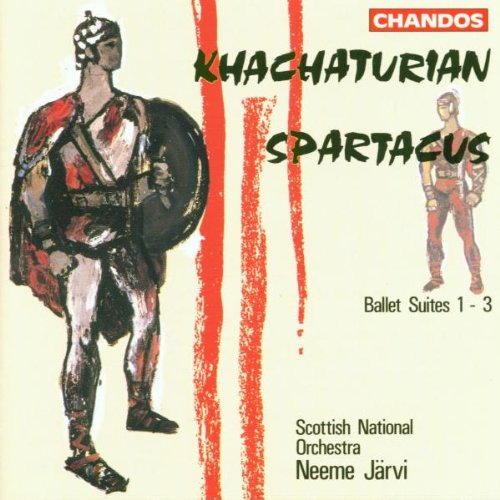Khachaturian Spartacus Ballet Suites 1-3
View record and artist detailsRecord and Artist Details
Composer or Director: Aram Il'yich Khachaturian
Label: Chandos
Magazine Review Date: 5/1991
Media Format: CD or Download
Media Runtime: 63
Mastering:
DDD
Catalogue Number: CHAN8927

Tracks:
| Composition | Artist Credit |
|---|---|
| Spartacus Ballet Suite No. 1 |
Aram Il'yich Khachaturian, Composer
Aram Il'yich Khachaturian, Composer Neeme Järvi, Conductor Royal Scottish National Orchestra |
| Spartacus Ballet Suite No. 2 |
Aram Il'yich Khachaturian, Composer
Aram Il'yich Khachaturian, Composer Neeme Järvi, Conductor Royal Scottish National Orchestra |
| Spartacus Ballet Suite No. 3 |
Aram Il'yich Khachaturian, Composer
Aram Il'yich Khachaturian, Composer Neeme Järvi, Conductor Royal Scottish National Orchestra |
Author: Ivan March
Khachaturian's ballet, Spartacus, first produced in 1956, was a judicious, and in the event a highly successful artistic response to the demands of Soviet populist realism. For its dramatic narrative of a Roman slave rebelling against his captors, eventually to be betrayed and killed, the composer created a score of striking vitality, at once full-blooded and crude, passionate and tuneful, and yet undoubtedly individual. Shostakovich admired the ''original colourfulness of the orchestration''.
The ballet's most famous number, the ''Adagio of Phrygia and Spartacus'', with its sweeping string tune, is justly popular and the theme returns nostalgically at the end in Phrygia's parting scene. Elsewhere there are many expressions of joyous extroversion (the ''Variations of Aegina and Bacchanalia'') and scenes of wild revelry, in which the music erupts with great physical energy, for example the ''Entrance of the Merchants'' and the wild, boosey ''Dance of the Pirates'', both in Suite No. 2. The scene of ''The Market'' which opens Suite No. 3 has enormous bustle and reminds one of Kabalevsky in its glittering use of the xylophone. The romantic side of the score is full of languid sensuality: the Gaditanian Maidens (in the First Suite) are deliciously and decadently alluring, and the ''Dance of the Egyptian Girl'' is hardly less seductive in its sentient atmosphere. Those who enjoy the ''Sabre Dance'' from Gayaneh will respond to the vigorous ''Dance of a Greek Slave'' with its fiery rhythmic bite, given a catchy syncopated twist.
Jarvi and the Scottish players respond exuberantly to the near vulgarity of the unbuttoned animation and obviously revel in the lusher evocations. The resonant acoustics of the Henry Wood Hall, Glasgow, cast a rich ambient glow over Khachaturian's vivid primary colours, and prevent the cruder climaxes from sounding too aggressive.'
The ballet's most famous number, the ''Adagio of Phrygia and Spartacus'', with its sweeping string tune, is justly popular and the theme returns nostalgically at the end in Phrygia's parting scene. Elsewhere there are many expressions of joyous extroversion (the ''Variations of Aegina and Bacchanalia'') and scenes of wild revelry, in which the music erupts with great physical energy, for example the ''Entrance of the Merchants'' and the wild, boosey ''Dance of the Pirates'', both in Suite No. 2. The scene of ''The Market'' which opens Suite No. 3 has enormous bustle and reminds one of Kabalevsky in its glittering use of the xylophone. The romantic side of the score is full of languid sensuality: the Gaditanian Maidens (in the First Suite) are deliciously and decadently alluring, and the ''Dance of the Egyptian Girl'' is hardly less seductive in its sentient atmosphere. Those who enjoy the ''Sabre Dance'' from Gayaneh will respond to the vigorous ''Dance of a Greek Slave'' with its fiery rhythmic bite, given a catchy syncopated twist.
Jarvi and the Scottish players respond exuberantly to the near vulgarity of the unbuttoned animation and obviously revel in the lusher evocations. The resonant acoustics of the Henry Wood Hall, Glasgow, cast a rich ambient glow over Khachaturian's vivid primary colours, and prevent the cruder climaxes from sounding too aggressive.'
Discover the world's largest classical music catalogue with Presto Music.

Gramophone Digital Club
- Digital Edition
- Digital Archive
- Reviews Database
- Full website access
From £8.75 / month
Subscribe
Gramophone Full Club
- Print Edition
- Digital Edition
- Digital Archive
- Reviews Database
- Full website access
From £11.00 / month
Subscribe
If you are a library, university or other organisation that would be interested in an institutional subscription to Gramophone please click here for further information.




